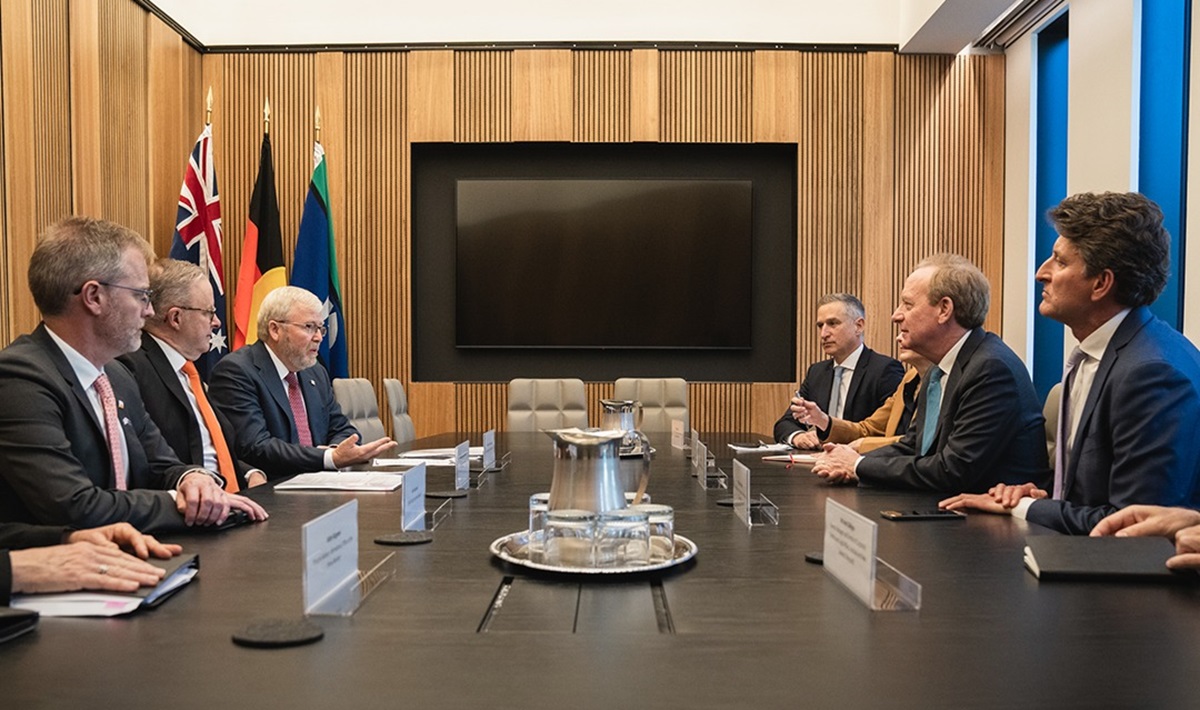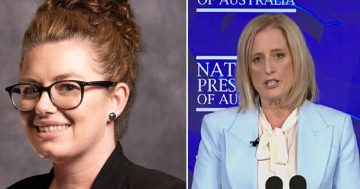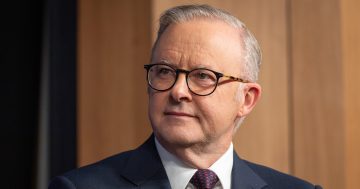
Australian officials including Prime Minister Anthony Albanese and US Ambassador Kevin Rudd discuss the deal with Microsoft officials in Washington. Photo: Facebook.
Tech giant Microsoft will invest $5 billion in Australia to enhance digital infrastructure, skills, cybersecurity and artificial intelligence (AI) capabilities.
Announced in Washington DC to coincide with Prime Minister Anthony Albanese’s visit, the company said it would expand its hyperscale cloud computing and AI infrastructure in Australia over the next two years. It said this would strengthen economic competitiveness, create high-value jobs, and protect the nation from the increasing threat of cyber attacks.
Australia’s Ambassador to the US Kevin Rudd, the US Ambassador to Australia Caroline Kennedy, and Microsoft vice chair and president Brad Smith, and Microsoft Australia and New Zealand managing director Steven Worrall also attended the announcement.
Part of the investment will be a partnership with NSW TAFE to establish a Microsoft Datacentre Academy, and investments in its global skills programs to help more than 300,000 Australians involved in the current and future cloud- and AI-enabled economy.
The Datacentre Academy’s curriculum will align with core operational roles according to Microsoft, including data centre technicians, critical environment specialists, inventory and asset management professionals, and IT operations personnel.
Other investments include a collaboration with the Australian Signals Directorate (ASD) on the Microsoft-Australian Signals Directorate Cyber Shield (MACS) aimed at better protecting residents, businesses and government from cyber threats. To achieve this, Microsoft will work with ASD to build what it calls “fit-for-purpose, next-generation cybersecurity solutions”.
Microsoft said ASD’s national Cyber Watch Office received more than 76,000 cyber crime reports in 2021–22, an increase of nearly 13 per cent from the previous year. It said MACS would include the evolution of national threat intelligence sharing capabilities, with a focus on detecting, analysing and defending against sophisticated nation-state cyber threats.
Mr Albanese said the agreement was a major investment in skills and workers to help strengthen Australia’s position as a world-leading economy.
“A priority for my Government is to ensure all Australians benefit from economic growth,” he said. “This means that we need to provide the skills to enable Australians to succeed in the jobs of the future.
“A strong economy requires protection from cyber threats. I welcome Microsoft’s collaboration with the Australian Signals Directorate to enhance cybersecurity for households and business.”
Mr Smith said this was Microsoft’s largest investment in the company’s 40-year history in Australia and a “testament to our commitment to the country’s growth and prosperity in the AI era”.
Director-general of the ASD Rachel Noble said: “This announcement builds on ASD’s strong partnership with Microsoft and will turbocharge our collective capacity to protect Australians in cyber space.”
Monash University’s Head of Department of Software Systems & Cybersecurity, Faculty of Information Technology, Professor Monica Whitty said the announcement and the intention to invest in building a “cyber shield” signified the recognition and urgent need to increase cybersecurity capacity in Australia.
“While it is difficult to know exactly how this ‘cyber shield’ will be implemented, what is important for Australians to know is that we have a cybersecurity skills gap that urgently needs addressing,” she said.
“In Australia, we need to improve basic levels of digital literacy and training that organisations might provide. But even more importantly, there is a need to increase the number of highly trained cybersecurity specialists in undergraduate and postgraduate degrees – given that currently the government and industry are struggling to recruit this much-needed talent from within the country.”
Professor of Practice Nigel Phair from Monash’s Department of Software Systems & Cybersecurity, Faculty of Information Technology said while this announcement was largely centred on building new data centres, it also focussed on two “rapidly growing areas of cybersecurity – cloud computing and AI”.
“Australia, like the rest of the world, faces huge challenges to not only continually embrace the benefits of these technologies, but also to manage the cyber risks surrounding their use.”
Original Article published by Andrew McLaughlin on Riotact.











